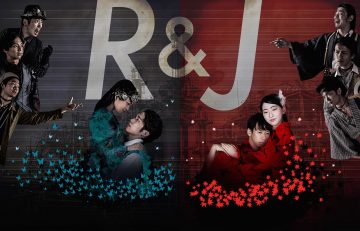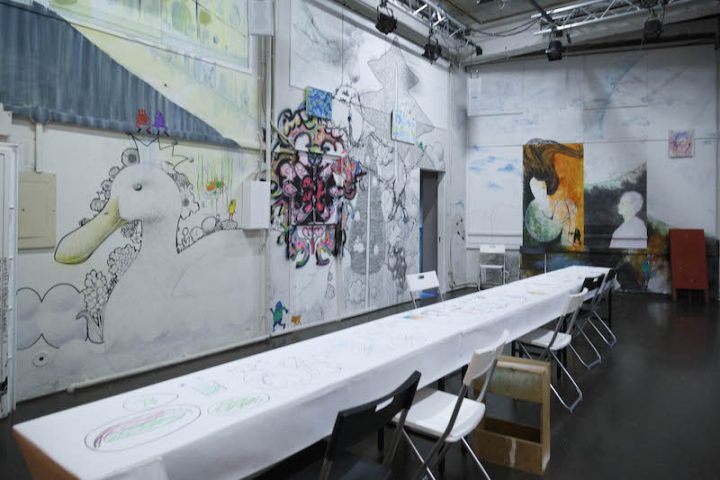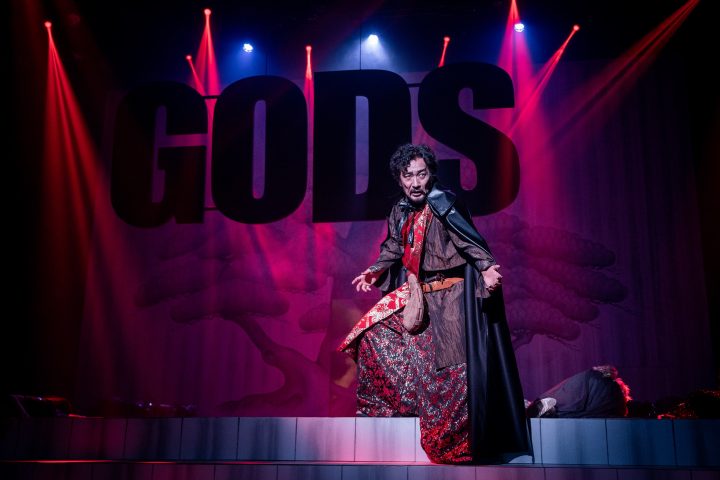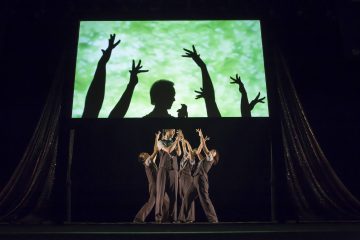A discussion between Tomofumi Nakayama, Mariko Ono and Kensuke Yokouchi | ENGEKI KANAGAWA
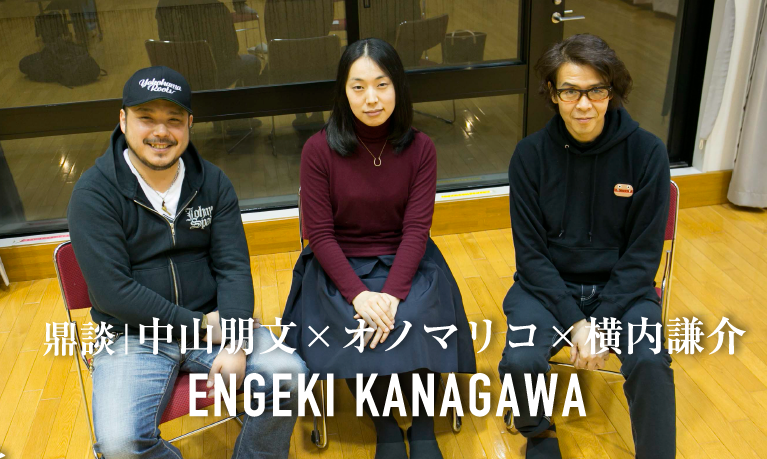
Under the catchphrase "Magcal", theater-related projects are now booming in Kanagawa. First, the stage talent development course "Magcal Performing Arts Academy" was held, and in January the "Kanagawa Kamome Short Play Festival" started as a short play contest unique to Kanagawa. In addition, new developments have begun, such as "Shuku" holding a solo performance at KAAT Kanagawa Arts Theater after participating in "Magcal Friday", a support program that rents theater space to theater companies. So, Magcal.net gathered director Kensuke Yokouchi, who is participating as the principal of the "Magcal Performing Arts Academy", Tomofumi Nakayama, who is a member of the executive committee of the "Kamome Theater Festival" and the first and second generation Kanagawa Theater King, and Mariko Ono, the head of "Shuku", who is about to hold a solo performance at KAAT, to talk about the Kanagawa theater scene, including their enthusiasm for disseminating information from Kanagawa and the potential of the stage scene in Kanagawa.
Interview & Text: Eriko Arai Photo: Masamasa Nishino
Recorded on December 22, 2015 at Kanagawa Prefectural Youth Center | Released on January 13, 2016
There was nothing special about Tokyo.
-First, please tell us about your connection with Kanagawa and what led you to make it your base.
Onoma : I'm from Fujisawa City, Kanagawa Prefecture, and when I first wanted to do a theater performance, I chose ST Spot in Yokohama because people around me would come. After that, I worked as an assistant director in Tokyo, but there are many theater companies and performances in Tokyo, and I felt that there was no point in me doing it among them. When I was preparing for the second performance, KAAT was just formed. I wrote a work that needed a large space and wanted to perform it in a large theater, so I called and applied for a rental hall. So, the first rental hall for KAAT's theater performance was "Shuko". A good theater was formed in Kanagawa, and we even performed there, so there was no point in doing it in Tokyo. I thought that if I could do it here, there's no need to go far, so I've continued in Kanagawa. If there are more people in Kanagawa who want to see theater, I would like to do theater performances in Fujisawa and Kamakura.
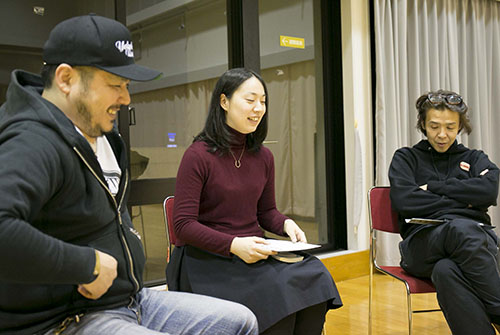
Nakayama : I originally worked as an actor in small theaters, movies, and television in Tokyo, but I was born and raised in Yokohama, so I always wanted to work in Yokohama. That started about 10 years ago, when my mentor did a project to create a play with local people in Mikuni-cho, Fukui, and I participated in it as an actor. From then on, I had a strong desire to work in my hometown, and I went to Yokohama to see plays by various groups. When I went to see a play at the Sotetsu Honda Theater, which closed in 2014, the Yokohama Mirai Engekijin Theater was performing Norihiko Tsukuda's work "Nukegara," which I thought was really interesting, so I asked to join them and that's how I moved to Yokohama.
The Yokohama Mirai Engekijin Theater was a three-year project that began in 2007 as part of the 150th anniversary of the opening of the port of Yokohama. It was a workshop-like project to train performers and promote their works. It was also great that I met Ichiro Onishi and Satoru Jitsunashi there.
As for why I chose Yokohama, actually, I simply don't want to take the train. Once I cross the Tama River, I feel a bit suffocated (laughs). The roads are a bit narrow and the buildings are tall, so I feel a sense of oppression. I've lived in Yokohama for 40 years, and even when I was active in Tokyo, I went to Tokyo and came back to Yokohama, but since then, I've felt that there's nothing in particular in Tokyo. On the other hand, if you ask me if there's anything in Yokohama, I don't think there's anything in particular either (laughs). But if I'm working in my hometown, I feel like I have to try even harder because if I fail, I'll have nowhere else to go.
Yokouchi : When we started acting, we had a pretty simple goal: to increase the audience and go to Tokyo to perform at Kinokuniya Hall. We just went along with it and never performed in earnest in Kanagawa, but Tobira-za was originally a theater company that we formed with friends from Atsugi High School to enter a high school drama competition, and it was at this Youth Center that I first encountered theater. It's an inseparable relationship with Kanagawa, or rather, with the Youth Center, so much so that I would say, "Without the Youth Center, I wouldn't be who I am today."
At that time, the Youth Center had a legendary director named Tamura Tadao. He worked hard on school plays, and said he wanted to show good plays to children, so he showed plays to high school drama club members in Kanagawa Prefecture for 500 yen. So, as soon as I joined the drama club in high school, a senior brought me here, and I saw Tsuka Kohei's "Atami Murder Case" and got hooked on theater. Moreover, at a time when theater for children was the mainstream, they brought the most popular things. So I saw the Shiki Theater Company here, and I was able to encounter the plays of Shimizu Kunio and Shinozaki Mitsumasa, such as those in Jean Jean. They also held workshops before the rest of the country. Of course, there was no word "workshop" yet, and they called it a "theater seminar." Leading theater people were teaching theater to high school students.
There was no other place like it. This was my first encounter with a public hall, and I later came to think of it as a model.
When I started Tobiraza, I told Tamura, "I've started a theater company," and he continued to support me and help me in various ways. When he passed away, he said, "I'm counting on you to take care of theater in Yokohama," and I felt like I heard his will. I can't do something so big, but I thought it would be good to revive what existed at that time, even if only a little... So, what I'm doing in Kanagawa now is not my own artistic activities, but something a little more public. I feel deeply moved that I started the Performing Arts Academy and have returned to the Youth Center through various connections. I do it because I think it's what I should do.
A place that attracts people who want to learn: the Performing Arts Academy
-- "Magcal Performing Arts Academy," where Yokouchi serves as the principal, is a theater and musical school that opened in October 2014 with the goal of developing talent in Kanagawa. How do you feel after a year of operation?
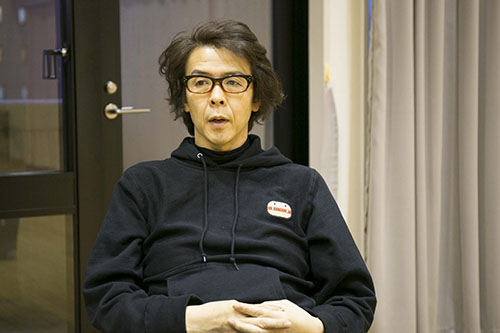
Yokouchi : At the Academy, we start by training actors, but I think it would be better to also provide training facilities for writers and directors. You can't learn this kind of thing no matter where you study. I don't think that holding a seminar will necessarily produce a writer, but it should still be a catalyst for people who are starting to write works on their own or who are wondering how to direct. When thinking about producing masterpieces from Kanagawa, I think it's important to broaden the base and provide some kind of budget and space.
I also participated in a high school drama competition, but I didn't have a teacher, so I wish I could have been taught in some places, especially when it came to directing. We created our own group, so it was the best training ground for us to make it interesting. But after 20 or 30 years, I was often shocked to find that I didn't know such simple things. When we were in our day, everyone was doing it by trial and error, so it was fine if we had different values, but now I think that it's easier to create something if everyone shares some standards, such as the way lines are written and how to behave, and "this is the only thing we should do."
Onomah : So it's an actor's standard?
Yokouchi : And also directing. It's really tough being an actor these days. If there are three directors, they'll all say different things, and only those who can handle that well will survive as professional actors. I think that's very inefficient. Even if the Academy can't provide a place where you can learn the standards, I want it to be a place that welcomes those who want to learn. Do you two have a mentor?
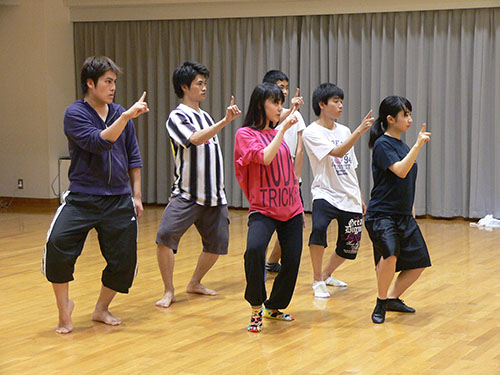
Magcal Academy practice scene
Nakayama : My mentor as an actor was Nakajima Harunori. When he first started teaching at an acting school, I was his first student.
Onomah : I originally liked reading plays like novels. I didn't do theater myself, but I liked watching them. One day, someone said they'd do it if I wrote something, so I thought I'd give it a try. I performed at a coffee shop, and someone who saw it told me about the "Playwriting Club" that was held at a public facility near the Landmark (Yokohama Civic Activities Support Center). It was a kind of temple school run by Hirofumi Okano, who was the editor-in-chief of Shingeki. We all wrote scripts and showed them to each other, and that's how we learned.
Yokouchi : Wow. Okano-san also grew up in the youth center. Tamura-san used this public facility for personal training of actors. He picked out talented students from high school drama classes and opened a private school with about 20 students. Some of the actresses who grew up there are Godai Michiko and Takase Haruna, and Okano-san was a staff member at the school, working in charge of sound. I was training to be a writer, and Tamura-san would sometimes ask me to show him what I'd written, and he would correct my work. I had a vague idea that I had to set up a school here because of that private school.
That's funny, we connected at the youth center (laughs).
Magcal Theater in KAAT Theater Company "Shuko" Performance
--The Youth Center seems to have a mysterious connection. "Shuko", which is presided over by Mr. Onoma, was selected for "Magcal Theater in KAAT" after participating in the Youth Center's "Magcal Theater".
Onoma : One group is selected throughout the year and is allowed to borrow KAAT for one week. After it was decided that we would be the performing group, we submitted a proposal to KAAT several times and proceeded with the project while consulting with them. I am a playwright, and "Shuku" is not a theater company but a one-man unit. We start with a plan and then meet with directors and actors each time. This time, we first met Kikue Fukamui, who is researching polyamory. We both belong to the "Nagashima Kaku's Creation Research Institute" of the Tokyo Art Point Project, and in 2014 we held workshops to learn about polyamory and made board games there. After that, I thought that since polyamory is a story about relationships in which multiple people are in love, it would be good to express it in a play, so I submitted a proposal. After it was accepted, I began looking for a director who would be willing to take on the project, and KAAT introduced me to Tomoya Kiriyama, and after meeting him in person and talking to him and showing him videos of his directed works, I decided to ask him to do it.
*POLYAMORY: A sexual style and lifestyle in which people build consensual relationships with multiple people. It is popular in the United States and around the world.
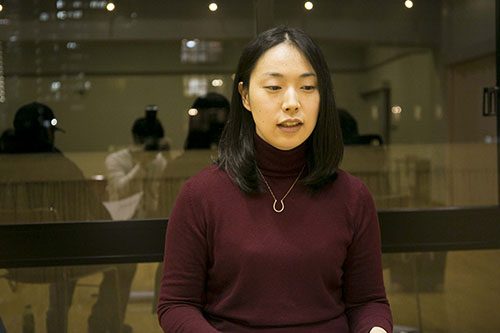
--You said that you had never performed in theater yourself, but how did you first encounter theater?
Onoma : When I had just graduated from university, I heard that an acquaintance of mine was going to start a theater company. I thought it was amazing that a theater company can start its own company, set its own prices and sell its own tickets. Until then, I thought that applications and permission were required. I could do it myself. It was free and interesting, and that's when I became interested. After that, I started writing plays at the Terakoya school of Mr. Okano that I mentioned. Gradually, I started watching small theaters in Tokyo and Kanagawa, and when I wrote my impressions in questionnaires, I was invited to be an assistant director, and I learned how to create plays while doing that a few times. In 2010, I decided to try my hand at my own unit and rented the ST Spot for my first performance. It was just that I was interested in it, and then something developed.
Kanagawa Kamome Short Play Festival starts in January
--Now, about the 1st "Kanagawa Kamome Short Play Festival" to be held at KAAT from January 29th to 31st. Mr. Nakayama is on the executive committee, and this is a contest in which short plays of less than 20 minutes compete in a tournament format, and the winner is decided by votes from the judges and the audience. Please tell us about the opportunity to start it as an original brand of Kanagawa.
Nakayama : To be honest, the biggest request came from the prefecture's Magcul project. There is a short play contest called "Gekiou" sponsored by Nagakute City, Aichi Prefecture and the Tokai branch of the Japan Playwrights Association, and the founder, Norihiko Tsukuda, asked us to hold the Kanagawa preliminary round. This led to the development of "Gekiou Kanagawa", and in February of this year (2015), we held the national tournament at KAAT. The "Kamome Theater Festival" was newly launched in Kanagawa based on the network we had built at that time.
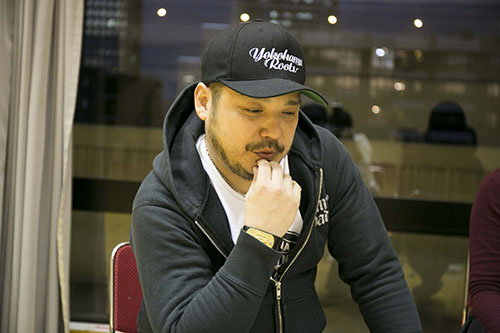
Yokouchi : I was involved from the beginning when we first started talking about doing it. We had the good fortune of meeting a governor who loves theater. It may be the first time in our lives that we come across a "head of a theater lover," including a mayor and village mayor. In order not to miss this rare opportunity, we had to do something immediately, so we started the "Magcal Performing Arts Academy" and the "Kamome Theater Festival."
It's hard to run a theater festival, with many people involved and many meetings over the course of months. I think that meeting people in the process will move something, and it will also be an opportunity for the governor to understand that there are so many theater people in Kanagawa. I hope that holding the event will bring about changes in the town and encounters between people, and I think "Kamome" will be a very good device for that. Moreover, since Mr. Nakayama's generation is managing it well, I think it will be something that will continue in the future, but what do you think?
Nakayama : That's right. Kanagawa has a history of amateur theater, and there are many theater people, but there is no horizontal connection, and there were not many opportunities to meet. I started the Kanagawa preliminaries of "Gekiou" and started to interact with theater people of the same generation, and that's where I met Onoma-san. I think the best thing about doing it was that it became an opportunity to meet people. I also did "Gekiou Kanagawa" four times, and I thought it was great that several theater companies born in the Heisei era participated in 2015. Of course, there are many people who are opposed to the ranking, such as what's the point of deciding the ranking. Also, this rule makes it easy to come up with trends and countermeasures for how to please the audience and be evaluated by the judges, and to be honest, it's not that there are no points where it's not interesting if it goes too far (laughs). But planning that strategy will definitely lead to the power of the theater company, and I think it will definitely come in handy when creating a play for the main performance.
"Kanagawa Kamome Short Play Festival"
Onoma : Yes, I don't think there's any danger in being good at short stories. I myself submitted a very serious short story and it didn't get many votes. But I got to know a lot of people in the theater world, and I didn't know there was a theater company in Odawara until then, so it was fun.
Nakayama : Onoma was in the same block as us, but he got a lot of votes from the judges. The Kamome Theater Festival also invites people with various tendencies to be judges, and they are free to allocate their points as they wish. For example, if there are 40 points, they can give themselves "20, 10, 10, 0" or even 1 point. The governor even gave us 0 points (laughs). And after the results are announced, the judges give their comments on each piece, which is also interesting. This time, we have asked Yokouchi to be a judge.
Yokouchi : I've only seen "Gekiou" and this is my first time judging "The Seagull", but since I'm in front of the actors themselves, I have to be fired up. I'm putting my theatrical views on the line when I say why I think it's boring. In the end, if you listen carefully to the judges' comments, they're talking about their own plays. Since each of them is a writer or director, they can only use their own standards. So, as an event, it's fun to hear their comments.
I think there are possibilities like this when it comes to doing things locally.
--You are the artistic director of the Atsugi Cultural Center, and the new works of your theater company Tobira-za are always performed in Atsugi on the first and last day. What do you think is the difference between Atsugi and other places?
Yokouchi : It's not a difference between regions, it's a difference in relationships. In the case of Atsugi, there are local people who have been supporting us for over a decade, calling themselves the cheering squad. When we say that tickets aren't selling, they work to invite more people, treat young actors to ramen, let them stay when they can't go home... they continue to support us. When a supporting actor gets a good role, they cheer us on with joy, and when we go to Tokyo, they follow us and come to see us. It's a place where there are customers who continue to watch the development of actors and the state of the theater company with constant observation. I think there are possibilities like this in performing in a local area. We are comfortable there, so we always start and end our performances in Atsugi, and they look forward to it, too.
When a German man named Peter Gessner was the artistic director of the Chofu Sengawa Theater for two years, he spoke about how people should behave when they have a theater in their town. I remember him saying this. KAAT was opened in Yokohama. In fact, I think people should be more excited that there is such an interesting place in their town, and we need to be more excited about it. It's not like, "I'll go if it's interesting." I think that the original way of having a theater in our town is to "watch everything and support it together."
Onoma : It's the relationship between the theater and the town, and between the theater and the people.
Yokouchi : And the theater will also work hard to present something as interesting as possible. I would like to create that kind of relationship and environment.
So I think that KAAT and the Youth Center need to show a more public presence. Of course, the commercial aspect is necessary, but they can't have the same function as a commercial theater. And local theater people perform at the theater, and the people support them. That's the kind of audience I want to create. I don't think we need to work hard in Kanagawa to attract customers by having celebrities come and do flashy things. I want to create an audience that supports the theater.
Deeper and broader: Future prospects
--Listening to your story, I feel that Kanagawa has its own unique characteristics that are different from Tokyo. Finally, please tell us your aspirations and prospects for your future activities.
Nakayama : First of all, I want many people to see the Kamome Theater Festival. This time, two groups from Kanagawa will be performing, and two groups from Korea will be coming. Also, on a personal note, our rehearsal studio is right next to the Kanagawa-Shinmachi station on the Keikyu line, and we hold a monthly social gathering there. This is the Yokohama Theater Salon, which was held once a month at the now-defunct Sotetsu Honda Theater, and we are continuing to hold it at our rehearsal studio. By gathering people in this way, we hope to provide a venue for young theater companies and fulfill that function. Listening to Yokouchi's story about the supporters, I thought that this is the way it should be in terms of ties with the local community, and I hope we can make it into that kind of place.
Onoma : I also want to make "THE GAME OF POLYAMORY LIFE" in January a good production. I also often work with high school students in Tokyo and Osaka. I am a judge for a competition and I adapt the script for the "High School Drama Summit" at Komaba Agora Theater, a project to show high school plays to adults. I was once asked to write a script by a high school drama club in Osaka, where I became friends. As I listened to the stories of high school students, I became very interested in them, so this year I plan to work on creating a production with high school students. Also, "THE GAME OF POLYAMORY LIFE" is 1,000 yen for those under 18. It is a production that depicts various love and lifestyles, and I think it will resonate with people of all ages, so I hope many people will come to see it.
Yokouchi : I want to increase the number of participants in the academy a little more, and then I'd like to start creating works next year, and have something to show by the end of next year (2016). If you don't have a goal like that, it's tough to do it with just lessons.
<Performer Profile>
Tomofumi Nakayama
Born in Yokohama, Kanagawa Prefecture in 1974. Actor, director, and playwright. Head of Theater 045 Syndicate.
In 2001, he made his acting debut in "One Flew Over the Cuckoo's Nest" at Sunshine Theater. He worked in small theaters, movies, and T㈸ in Tokyo, but in 2007 he returned to his hometown of Yokohama and joined the Yokohama Mirai Engekijin Theater. After the group disbanded, he launched Theater 045 Syndicate in 2010. In addition to theaters, he also works on plays, live shows, and dance events at bars and restaurants in Chinatown. In 2012, he produced "Gekiou X Kanagawa Preliminary - Chinatown Royale!" at Chinatown Dohatsu Shinkan. He won and represented Kanagawa at the Tenka Toitsu Tournament held in Nagakute City. Since then, Gekiou has been held four times at the Youth Center. He is the first and second Kanagawa Gekiou. His main works performed in the city include "Shiden Udon", "Mary's Coffin", "Tora☆Harimao" (performed at Yokohama Mirai Engekijin Theater), "La Marea Yokohama" (performed), and the one-man plays "Yokohama Tansu Jijo" and "12 Piks" (performed by Theater 045 Syndicate). His hobby is visiting bars. He is often seen in Noge, Yoshida-cho, Chinatown, and Sorimachi.
Onomarico
Born in 1983 in Fujisawa City, Kanagawa Prefecture. Graduated from the Department of Philosophy at the Faculty of Letters and Sciences, Tokyo Woman's Christian University. Head of the theater group "Shuko".
In 2015, he performed "The Story of the Demolition of the Former Gymnasium Built by Antonin Raymond" at Theater Tram Next Generation vol.7. In January 2016, he was selected for the Magcal Theater in KAAT, and plans to perform his new work "THE GAME OF POLYAMORY LIFE" with the help of ethnography. He is also actively involved in creating works with high school students. In recent years, he has been thinking about "what a playwright can do in the world."
Kensuke Yokouchi
Born in Tokyo on September 22, 1961. Playwright and director. Head of the theater company "Tobira-za".
While attending Kanagawa Prefectural Atsugi High School, he joined the drama club under a surname loan. He was treated by a senior to a performance of "Atami Murder Case" by Tsuka Kohei Office, and was inspired to become an actor. He participated in a national drama competition with his debut work "It's a Salamander!" In 1982, while attending the Faculty of Letters, Arts and Sciences, Waseda University, he founded the theater company "Zennin Kaigi" with Atsugi High School drama club members Okamori Akira and Rokkaku Seiji, and Hosei Second High School club member Sugiyama Ryoichi. In 1993, he changed his name to "Tobira-za" and continues to do so to this day. In addition to his theater activities, he has also provided many works for external parties, such as Super Kabuki and musicals. In 1992, he won the 36th Kishida Kunio Drama Award for "The King's Nakedness of La Mancha, Invisible to Fools." In 1999, he became the youngest person ever to win the Otani Award for "New Romance of the Three Kingdoms." In 2015, he won the Otani Award again for Super Kabuki II "One Piece."
